块5 Unit 13 People lesson1
文档属性
| 名称 | 块5 Unit 13 People lesson1 |
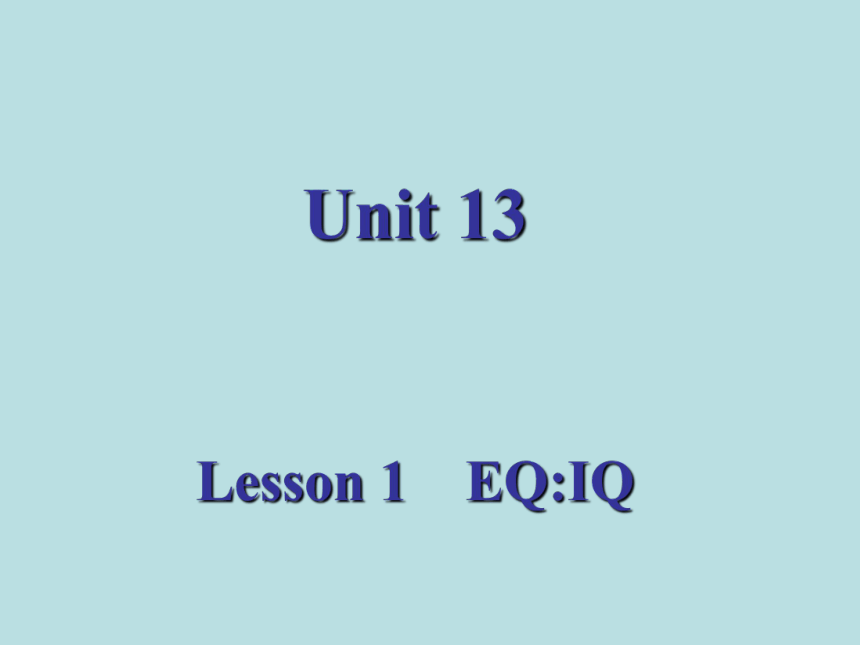
|
|
| 格式 | zip | ||
| 文件大小 | 405.0KB | ||
| 资源类型 | 教案 | ||
| 版本资源 | 北师大版 | ||
| 科目 | 英语 | ||
| 更新时间 | 2012-02-28 00:00:00 | ||
图片预览

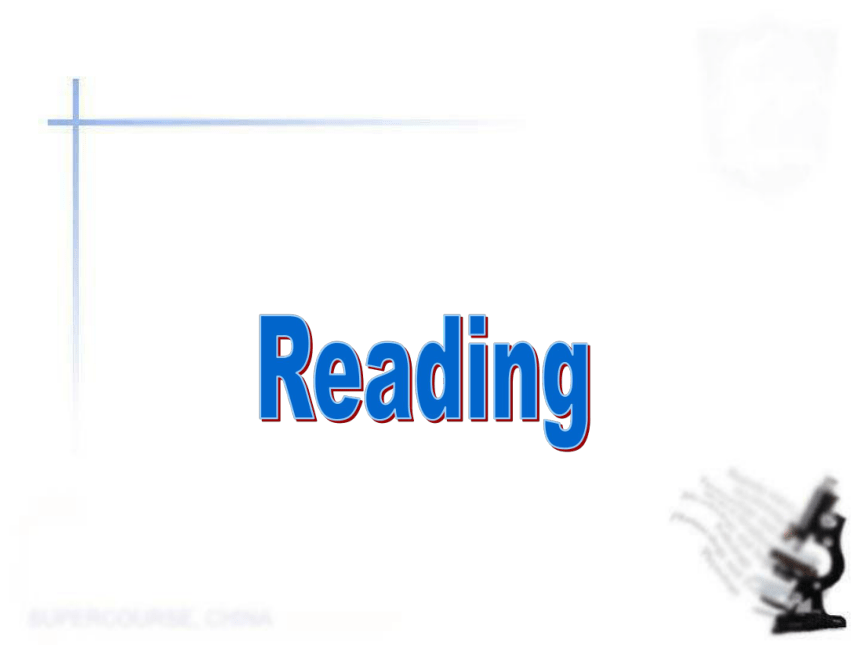

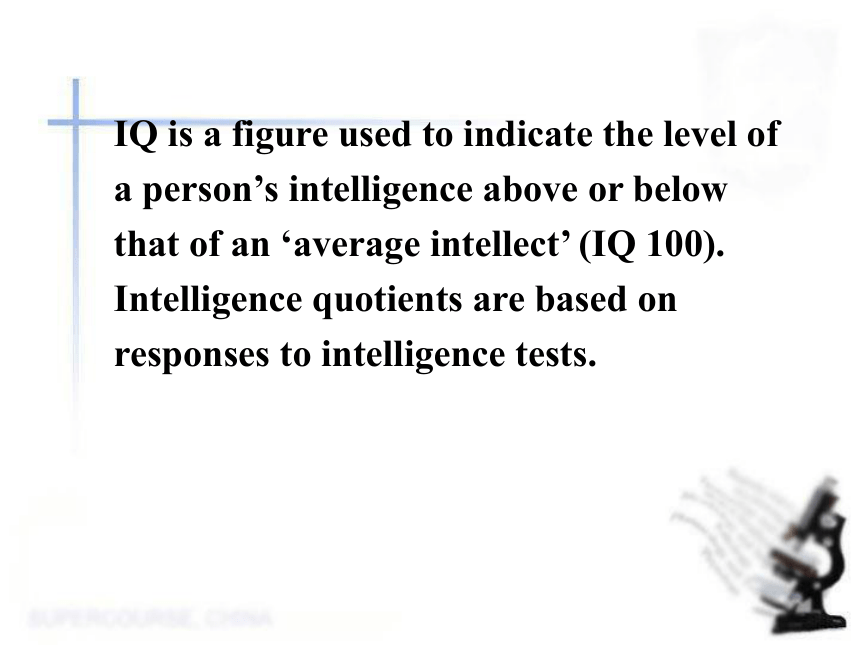
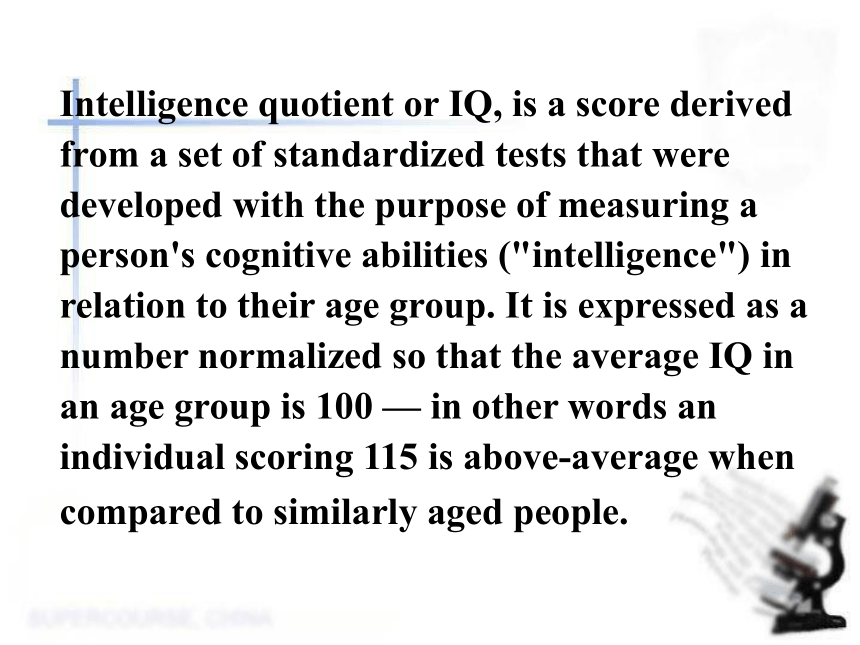
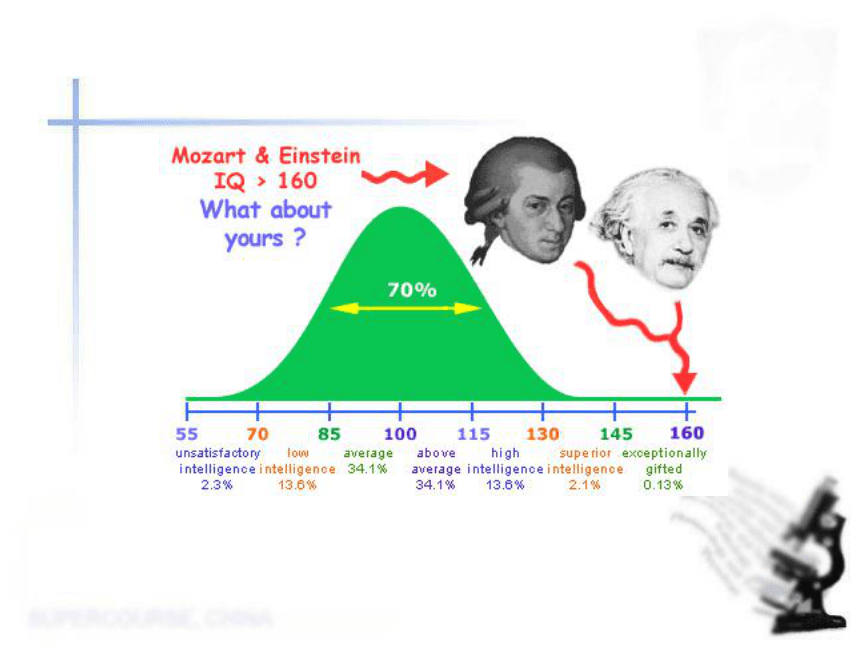
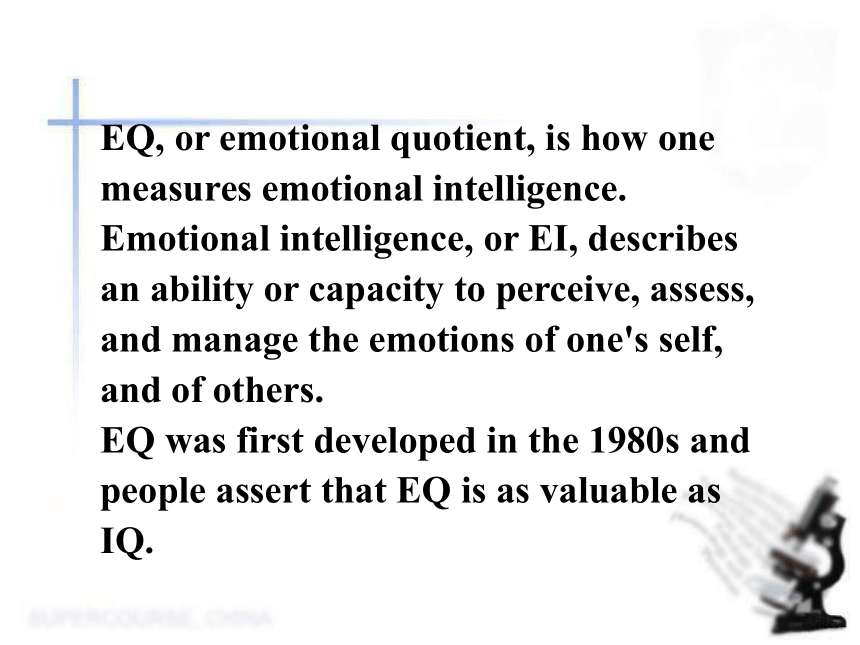
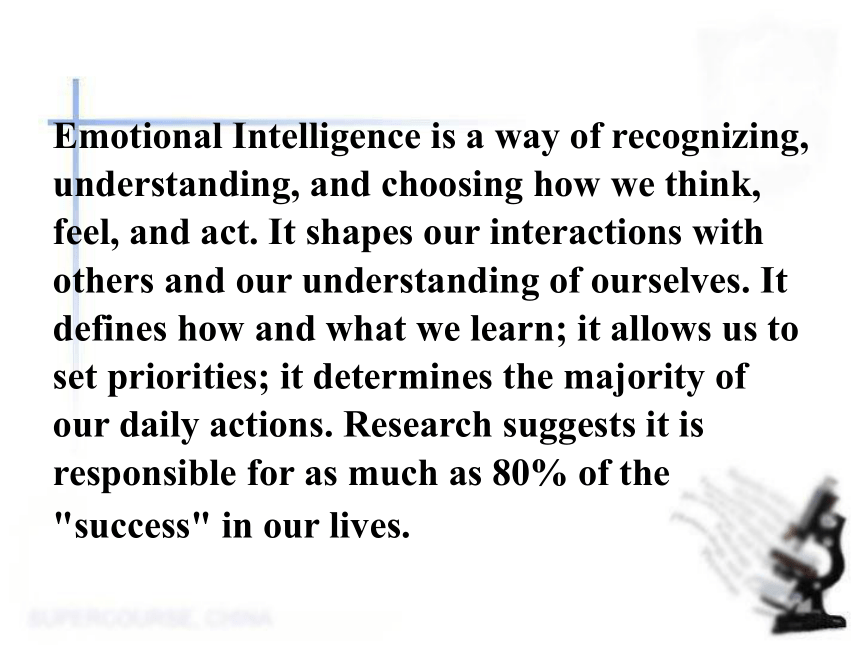
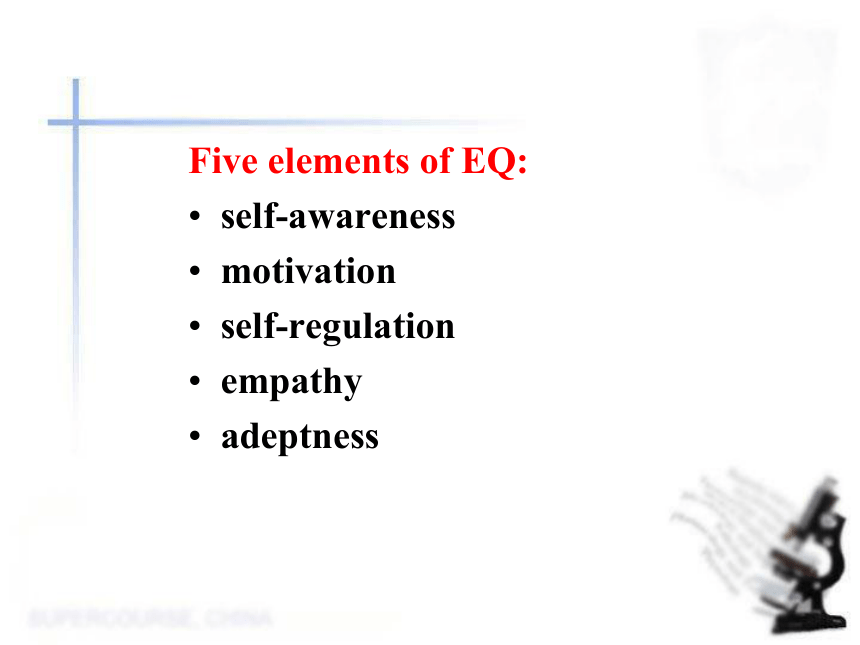
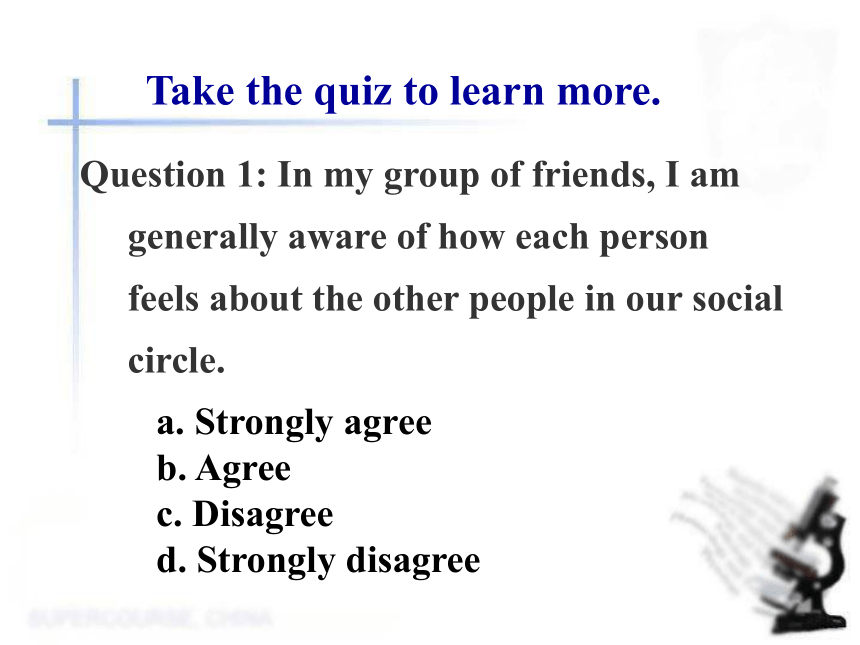
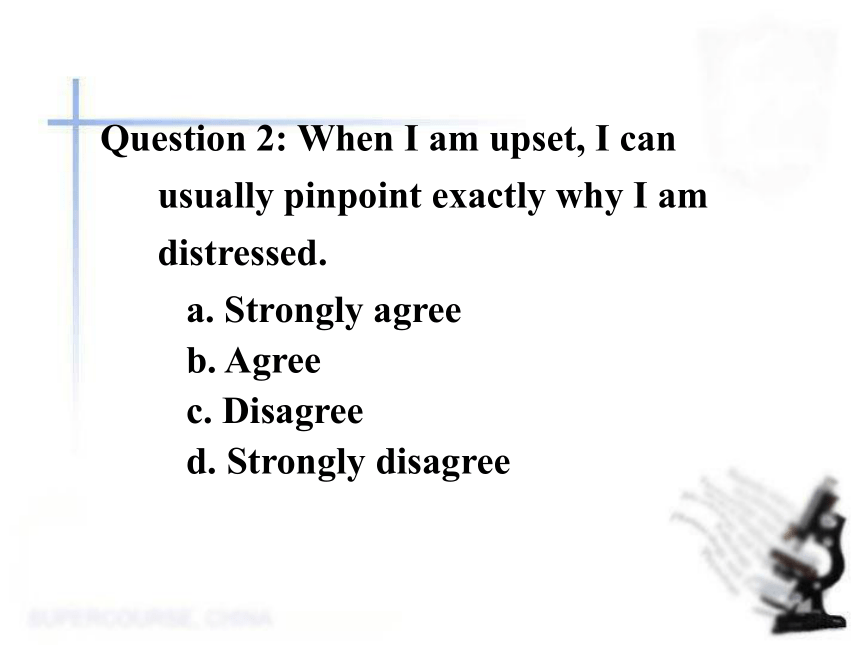
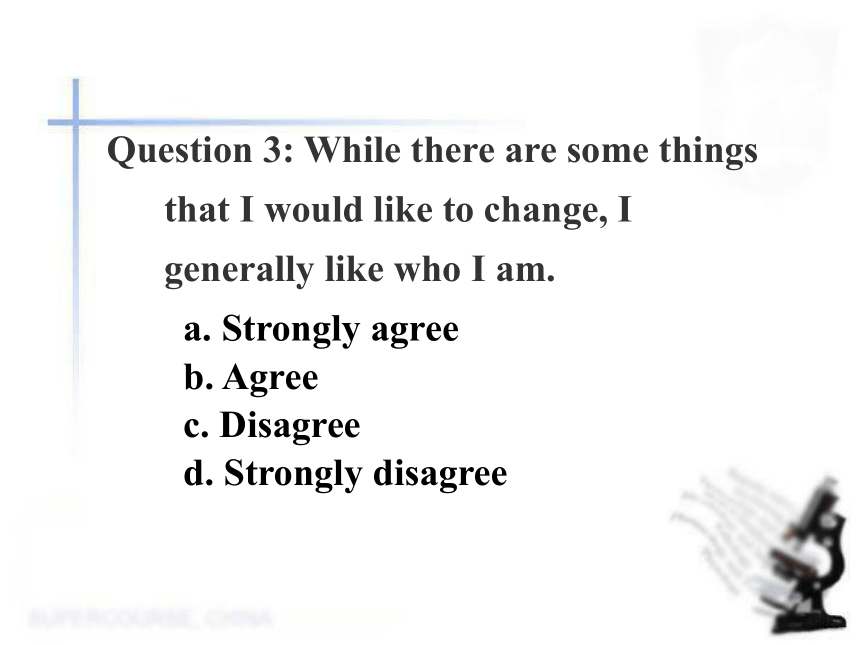
文档简介
(共53张PPT)
Unit 13
Lesson 1 EQ:IQ
How much do you know about IQ and EQ
The term “IQ”, intelligence quotient, was devised by the German psychologist William Stern in 1912.
IQ is a figure used to indicate the level of
a person’s intelligence above or below
that of an ‘average intellect’ (IQ 100).
Intelligence quotients are based on
responses to intelligence tests.
Intelligence quotient or IQ, is a score derived from a set of standardized tests that were developed with the purpose of measuring a person's cognitive abilities ("intelligence") in relation to their age group. It is expressed as a number normalized so that the average IQ in an age group is 100 — in other words an individual scoring 115 is above-average when compared to similarly aged people.
EQ, or emotional quotient, is how one measures emotional intelligence.
Emotional intelligence, or EI, describes an ability or capacity to perceive, assess, and manage the emotions of one's self, and of others.
EQ was first developed in the 1980s and people assert that EQ is as valuable as IQ.
Emotional Intelligence is a way of recognizing, understanding, and choosing how we think, feel, and act. It shapes our interactions with others and our understanding of ourselves. It defines how and what we learn; it allows us to set priorities; it determines the majority of our daily actions. Research suggests it is responsible for as much as 80% of the "success" in our lives.
Five elements of EQ:
self-awareness
motivation
self-regulation
empathy
adeptness
Question 1: In my group of friends, I am
generally aware of how each person
feels about the other people in our social
circle.
a. Strongly agree b. Agree c. Disagree d. Strongly disagree
Take the quiz to learn more.
Question 2: When I am upset, I can
usually pinpoint exactly why I am
distressed.
a. Strongly agree b. Agree c. Disagree d. Strongly disagree
Question 3: While there are some things
that I would like to change, I
generally like who I am.
a. Strongly agree b. Agree c. Disagree d. Strongly disagree
Read quickly and answer the question.
Who invented the term EQ
Professor Salovey.
Decide the sentences are true or false. 1. Most students think that their IQ
determines how well they are going to do in
life . 2. A new EQ study says that success is the result of a high EQ. 3. It’s proved that one’s EQ has nothing to do
with one’s IQ. 4. A student’s failure in exams results from a low IQ.
T
F
F
F
5. A high IQ may help you get hired easily at
work. 6. It is true that those with high IQs always have high EQs. 7. If you have a high EQ, you might get promoted when you start working. 8. Professor Salovey is an expert in the study
of changes in people’s EQs. 9. It is generally believed that a person’s IQ
can be improved. 10. People with high EQs often have new ideas and positive attitudes towards life.
T
F
T
F
F
T
Read and answer the questions.
1. What does the recent research say about a person’s success and his or her IQ
2. How does Professor Salovey describe EQ and IQ
3. Why do some smart students end up failing exams according to Prof. Salovey
4. Can a person’s EQ be improved What about his IQ Can you give some examples
5. What’s the meaning of “people skills” Is it important to improve them if you want to be successful in life Why/Why not
What does the recent research say about a person’s success and his or her IQ
How does Professor Salovey describe EQ and IQ
IQ tells you how smart you are while EQ tells you how well you use your smartness.
Success is not simply the result of a high IQ.
Why do some smart students end up failing exams according to Prof. Salovey
Can a person’s EQ be improved What about his IQ Can you give some examples
Maybe they have low EQs (Maybe their EQs are not high enough).
Yes. But IQ could not be improved.
After normal students helped the disabled students, they were more willing to help people. They also showed a better understanding of the disabled students’ feelings compared to students who hadn’t been introduced to disabled students. Disabled students become more positive and more eager to try new things.
“People skills” means ways /abilities of doing things. It is very important to get them improved. Better skills help you do things more easily and make you successful.
5. What’s the meaning of “people skills” Is it important to improve them if you want to be successful in life Why/Why not
Normal Ss
become
willing
to…and better
understanding
…
Disabled Ss
become more
positive…
and more
eager…
IQ gets you
hired; EQ
gets you
promoted.
Best and quick-witted Ss may fail.
Low EQ
people
find it harder to survive.
EQ is more important than IQ.
Success comes
with a high EQ.
EQ could be improved.
Discussion
Which do you think is more important, IQ or EQ, on your way to success Why
List some signs of high EQ.
What can we do to improve our own IQ and EQ
Do you think EQ and IQ tests should be a part of job recruitment Why
Signs of High EQ
A person with high EQ:
expresses his / her feelings clearly and directly with
three word sentences beginning with “I feel...”.
does not disguise thoughts as feelings by the use of
“I feel like....” and “I feel that...” sentences.
is not afraid to express his / her feelings.
is not dominated by negative emotions such as fear,
worry, guilt, shame, embarrassment, obligation,
disappointment, hopelessness, powerlessness and so
on.
is able to read non-verbal communication.
lets his / her feelings lead to healthy choices and
happiness.
balances feelings with reason, logic, and reality.
acts out of desire, not because of duty, guilt, force
or obligation.
is independent, self-reliant and morally
autonomous.
is intrinsically motivated.
is not motivated by power, wealth, status, fame, or
approval.
Tends to feel optimistic, but is also realistic,
and can feel pessimistic at times.
does not internalize failure.
is interested in other people's feelings.
is comfortable talking about feelings.
is not immobilized by fear or worry.
is able to identify multiple concurrent feelings.
Seven Powerful, Simple Techniques for Increasing EQ competence
1. Take time every day to appreciate what’s right in the world and in your life.
2. Increase your feeling word vocabulary.
3. Be your own best friend.
4. Listen with your heart.
5. Talk back to yourself.
6. Tune in to your body.
7. Smile more.
Discussion
Which helps you more in your studies, IQ or EQ Give some examples.
Analyze your problems and come up with a
plan to improve your grade.
1. (针对问题等)想出;提供 He came up with good ideas for the product promotion. He could not come up with a proper answer.
2. 赶上 We came up with a group of tourists.
3. 准备好(钱等) You must come up with the money by tomorrow night.
2. Go and see your teacher and try to talk
him or her into giving you a better grade.
talk sb. into sth. / doing 说服某人做某事
Let me try talking him into the project we are handling at the moment.
They talked me into going swimming with them.
You can't talk me into going there with you.
反义词:talk sb. out of说服某人别做某事
They tried to talk me out of going swimming.
I talked him out of working for his boss.
3. Draw up an agenda and discuss it with
the group.
a. 起草;制订 He has drawn up a vacation plan. In 1863, the Football association was formed to draw up rules and promote the interest of the game.
b. 使靠近 Draw up a chair and sit down.
c. 停住 A truck drew up in front of the house.
4. However, new research into EQ suggests
that success is not simply the result of a high
IQ.
suggest在这里的意思是“暗示;表明”。
His expression suggests that he didn’t sleep well last night.
The smile on his face suggested that he was satisfied with our work.
He nodded his head and smiled, which suggested that he had understood what I said.
predict v. 预言, 预见
The economists predicted an increase in the rate of inflation.
The fortune-teller predicted that I would marry a doctor.
It’s hard to predict when it will happen.
5. … when predicting someone’s future
success, their character, as measured by EQ
tests, might actually matter more than their
IQ.
prediction n.预言,预报
Her prediction turned out to be correct.
He made a prediction that the government would be defeated at the general election.
matter v. 重要,要紧
It doesn’t matter to me if I miss my train, because there’s another one later.
Does it matter whether he will come or not
matter n.
(1) 事情,问题
There are several important matters we must discuss.
麻烦事
There is nothing the matter with me.
物质(固体,液体和气体,与思想相对而言)
The universe is made up of matter.
Matter exists in three states: solid, liquid and gas.
6. …, who you think deserve good grades,
sometimes end up failing exams
deserve v.应受,该得
They deserved to be punished.
He deserves this glory.
You've been working all morning --- you deserve a rest.
deserve意为“值得,得到”时,一般不用进行时态。
end up 最终成为,最后处于…
If you go on like this you will end up in prison.
You will end up in debt if you keep on spending money like that.
You could end up running this company if you play your cards right.
7. On the other hand, there is little doubt
that people with low EQs often have
problems getting on with other people
and dealing with difficult situations; …
on the other hand 另一方面
I want to go to the party, but on the other hand I ought to be studying.
on the one hand…, on the other hand…一方面……,另一方面……
On the one hand, a lot of people are going to the USA, but on the other hand, a lot of
people are coming back from there.
There's … doubt that... 是固定句式,当doubt前有否定词时,其后用that引导同位语从句;当doubt前无否定词时,即主句为肯定句时,后面用whether引起从句。
There is little doubt that he will succeed.
There is some doubt whether he is guilty.
There was no doubt that he had been misunderstood.
get on with 与 ... 友好相处,…进展
It is hard to get on with a bad-tempered person.
How are you getting on with your work
deal with 应付;处理;关于
He has learnt to deal properly with all kinds of complicated situations.
I have a matter of importance to deal with. This book deals with an important issue.
do with、 deal with都有“处理,对待”的意思,但用法有区别。
do with常与what连用构成特殊疑问句,而
deal with常与how连用。如:
What have you done with your watch
How do they deal with the waste water
8. … thus they have a harder time surviving
in life.
thus adv. 因此
He didn't work hard. Thus he was fired.
He forgot to turn on the radio and thus missed the program.
so, therefore, thus这些连接副词均有“因此,所以”之意。
so: 用于比较随便的场合,口语中多用。
therefore: 通常指引出一个推断出的必然结论。
thus: 多用于书面语中,可与therefore换用。
9. …, especially in terms of “people skills”,
such as …
in terms of 就...而论;在...方面
In terms of finance, Company A has great advantage.
In terms of money, he's quite rich, but not in terms of happiness.
It was a bad year for films, in terms of both quantity and quality.
10. … of the disabled students’ feelings
compared to students who had not been
involved in the study.
compared to 与…比较;对照…
Compared to her sister, the lady earned much more money by selling women's clothes.
Imports in the first three months have increased by 10 per cent compared with the corresponding period last year.
compared to与compared with可通用,放于句首或句中,意为“与…相比”,可视为独立成分。
be involved in (表示状态) get involved in (动作感强,表示动作)
be involved in 涉及,包含在 ... 中
The reporter is curious to know whether the official is involved in the case.
I enjoy getting involved in things in my community.
11. They became more positive about life
and more willing to try new things.
positive adj. 积极的;肯定的;确定的
A positive attitude is a key part to determine your success.
He has a positive attitude towards life.
Are you positive that you saw him
There is positive proof that he did it.
12. To get ahead in the world and lead a
happy successful life means …
get ahead 领先;进步;获得成功
By doing extra homework, he soon got ahead of his classmates.
I've got ahead with my work.
He was talking about the way to get ahead in business.
13. … that their futures are not entirely
determined by their IQs.
entirely adv.完全地;彻底地
My life is entirely given up to work.
I entirely agree with you.
It was entirely my own fault.
I'm entirely satisfied with your performance.
It was a long time before the cut on my hand healed _____.
A. wholly B. actually
C. entirely D. completely
wholly, entirely 强调“整个,全部”,completely 因为是从形容词complete转化来的,它有圆满的意思在内。
D
Complete the sentences with the correct form of the words
in brackets.
description
Susan gave a good _______________ (describe) of Meg and Ann’s project. She said hers was not as good as theirs.
I think that the old man has a mental _________ (disabled).
There is a _______ (possible ) that we will travel to China this Easter holiday.
You are ___________ (mistake). John is not the man from the British Embassy.
Their plan to build a science park ended in ________ (fail).
This special school is for _______ (gift ) children.
possibility
disability
mistaken
failure
gifted
请根据括号内所给汉语意思或首字母提示完成下列各句。 1. She is the most _______ (有天赋的) student
in the class and she always comes first. 2. The report _______ (预测) that more jobs
would be provided by the local industry. 3. I thought I saw her at the movies but later
I found I was ________ (弄错的).
4. My grandfather once worked in the
American ______ (大使馆) so he had lots of
foreign friends.
gifted
predicted
mistaken
embassy
5. He lost a leg in an accident and his
d_______ prevented him from finding a
new job. 6. There’s a p_______ that we’ll go hiking, but it all depends on the weather. 7. She devoted herself e_______ to
scientific research and had no time to
spend with her family. 8. The boy’s f___________ resulted from
not working hard enough.
disability
possibility
entirely
failure
1. Review the text and underline the sentences with past participles.
2. Write a short passage to present your ideas about EQ or IQ.
Unit 13
Lesson 1 EQ:IQ
How much do you know about IQ and EQ
The term “IQ”, intelligence quotient, was devised by the German psychologist William Stern in 1912.
IQ is a figure used to indicate the level of
a person’s intelligence above or below
that of an ‘average intellect’ (IQ 100).
Intelligence quotients are based on
responses to intelligence tests.
Intelligence quotient or IQ, is a score derived from a set of standardized tests that were developed with the purpose of measuring a person's cognitive abilities ("intelligence") in relation to their age group. It is expressed as a number normalized so that the average IQ in an age group is 100 — in other words an individual scoring 115 is above-average when compared to similarly aged people.
EQ, or emotional quotient, is how one measures emotional intelligence.
Emotional intelligence, or EI, describes an ability or capacity to perceive, assess, and manage the emotions of one's self, and of others.
EQ was first developed in the 1980s and people assert that EQ is as valuable as IQ.
Emotional Intelligence is a way of recognizing, understanding, and choosing how we think, feel, and act. It shapes our interactions with others and our understanding of ourselves. It defines how and what we learn; it allows us to set priorities; it determines the majority of our daily actions. Research suggests it is responsible for as much as 80% of the "success" in our lives.
Five elements of EQ:
self-awareness
motivation
self-regulation
empathy
adeptness
Question 1: In my group of friends, I am
generally aware of how each person
feels about the other people in our social
circle.
a. Strongly agree b. Agree c. Disagree d. Strongly disagree
Take the quiz to learn more.
Question 2: When I am upset, I can
usually pinpoint exactly why I am
distressed.
a. Strongly agree b. Agree c. Disagree d. Strongly disagree
Question 3: While there are some things
that I would like to change, I
generally like who I am.
a. Strongly agree b. Agree c. Disagree d. Strongly disagree
Read quickly and answer the question.
Who invented the term EQ
Professor Salovey.
Decide the sentences are true or false. 1. Most students think that their IQ
determines how well they are going to do in
life . 2. A new EQ study says that success is the result of a high EQ. 3. It’s proved that one’s EQ has nothing to do
with one’s IQ. 4. A student’s failure in exams results from a low IQ.
T
F
F
F
5. A high IQ may help you get hired easily at
work. 6. It is true that those with high IQs always have high EQs. 7. If you have a high EQ, you might get promoted when you start working. 8. Professor Salovey is an expert in the study
of changes in people’s EQs. 9. It is generally believed that a person’s IQ
can be improved. 10. People with high EQs often have new ideas and positive attitudes towards life.
T
F
T
F
F
T
Read and answer the questions.
1. What does the recent research say about a person’s success and his or her IQ
2. How does Professor Salovey describe EQ and IQ
3. Why do some smart students end up failing exams according to Prof. Salovey
4. Can a person’s EQ be improved What about his IQ Can you give some examples
5. What’s the meaning of “people skills” Is it important to improve them if you want to be successful in life Why/Why not
What does the recent research say about a person’s success and his or her IQ
How does Professor Salovey describe EQ and IQ
IQ tells you how smart you are while EQ tells you how well you use your smartness.
Success is not simply the result of a high IQ.
Why do some smart students end up failing exams according to Prof. Salovey
Can a person’s EQ be improved What about his IQ Can you give some examples
Maybe they have low EQs (Maybe their EQs are not high enough).
Yes. But IQ could not be improved.
After normal students helped the disabled students, they were more willing to help people. They also showed a better understanding of the disabled students’ feelings compared to students who hadn’t been introduced to disabled students. Disabled students become more positive and more eager to try new things.
“People skills” means ways /abilities of doing things. It is very important to get them improved. Better skills help you do things more easily and make you successful.
5. What’s the meaning of “people skills” Is it important to improve them if you want to be successful in life Why/Why not
Normal Ss
become
willing
to…and better
understanding
…
Disabled Ss
become more
positive…
and more
eager…
IQ gets you
hired; EQ
gets you
promoted.
Best and quick-witted Ss may fail.
Low EQ
people
find it harder to survive.
EQ is more important than IQ.
Success comes
with a high EQ.
EQ could be improved.
Discussion
Which do you think is more important, IQ or EQ, on your way to success Why
List some signs of high EQ.
What can we do to improve our own IQ and EQ
Do you think EQ and IQ tests should be a part of job recruitment Why
Signs of High EQ
A person with high EQ:
expresses his / her feelings clearly and directly with
three word sentences beginning with “I feel...”.
does not disguise thoughts as feelings by the use of
“I feel like....” and “I feel that...” sentences.
is not afraid to express his / her feelings.
is not dominated by negative emotions such as fear,
worry, guilt, shame, embarrassment, obligation,
disappointment, hopelessness, powerlessness and so
on.
is able to read non-verbal communication.
lets his / her feelings lead to healthy choices and
happiness.
balances feelings with reason, logic, and reality.
acts out of desire, not because of duty, guilt, force
or obligation.
is independent, self-reliant and morally
autonomous.
is intrinsically motivated.
is not motivated by power, wealth, status, fame, or
approval.
Tends to feel optimistic, but is also realistic,
and can feel pessimistic at times.
does not internalize failure.
is interested in other people's feelings.
is comfortable talking about feelings.
is not immobilized by fear or worry.
is able to identify multiple concurrent feelings.
Seven Powerful, Simple Techniques for Increasing EQ competence
1. Take time every day to appreciate what’s right in the world and in your life.
2. Increase your feeling word vocabulary.
3. Be your own best friend.
4. Listen with your heart.
5. Talk back to yourself.
6. Tune in to your body.
7. Smile more.
Discussion
Which helps you more in your studies, IQ or EQ Give some examples.
Analyze your problems and come up with a
plan to improve your grade.
1. (针对问题等)想出;提供 He came up with good ideas for the product promotion. He could not come up with a proper answer.
2. 赶上 We came up with a group of tourists.
3. 准备好(钱等) You must come up with the money by tomorrow night.
2. Go and see your teacher and try to talk
him or her into giving you a better grade.
talk sb. into sth. / doing 说服某人做某事
Let me try talking him into the project we are handling at the moment.
They talked me into going swimming with them.
You can't talk me into going there with you.
反义词:talk sb. out of说服某人别做某事
They tried to talk me out of going swimming.
I talked him out of working for his boss.
3. Draw up an agenda and discuss it with
the group.
a. 起草;制订 He has drawn up a vacation plan. In 1863, the Football association was formed to draw up rules and promote the interest of the game.
b. 使靠近 Draw up a chair and sit down.
c. 停住 A truck drew up in front of the house.
4. However, new research into EQ suggests
that success is not simply the result of a high
IQ.
suggest在这里的意思是“暗示;表明”。
His expression suggests that he didn’t sleep well last night.
The smile on his face suggested that he was satisfied with our work.
He nodded his head and smiled, which suggested that he had understood what I said.
predict v. 预言, 预见
The economists predicted an increase in the rate of inflation.
The fortune-teller predicted that I would marry a doctor.
It’s hard to predict when it will happen.
5. … when predicting someone’s future
success, their character, as measured by EQ
tests, might actually matter more than their
IQ.
prediction n.预言,预报
Her prediction turned out to be correct.
He made a prediction that the government would be defeated at the general election.
matter v. 重要,要紧
It doesn’t matter to me if I miss my train, because there’s another one later.
Does it matter whether he will come or not
matter n.
(1) 事情,问题
There are several important matters we must discuss.
麻烦事
There is nothing the matter with me.
物质(固体,液体和气体,与思想相对而言)
The universe is made up of matter.
Matter exists in three states: solid, liquid and gas.
6. …, who you think deserve good grades,
sometimes end up failing exams
deserve v.应受,该得
They deserved to be punished.
He deserves this glory.
You've been working all morning --- you deserve a rest.
deserve意为“值得,得到”时,一般不用进行时态。
end up 最终成为,最后处于…
If you go on like this you will end up in prison.
You will end up in debt if you keep on spending money like that.
You could end up running this company if you play your cards right.
7. On the other hand, there is little doubt
that people with low EQs often have
problems getting on with other people
and dealing with difficult situations; …
on the other hand 另一方面
I want to go to the party, but on the other hand I ought to be studying.
on the one hand…, on the other hand…一方面……,另一方面……
On the one hand, a lot of people are going to the USA, but on the other hand, a lot of
people are coming back from there.
There's … doubt that... 是固定句式,当doubt前有否定词时,其后用that引导同位语从句;当doubt前无否定词时,即主句为肯定句时,后面用whether引起从句。
There is little doubt that he will succeed.
There is some doubt whether he is guilty.
There was no doubt that he had been misunderstood.
get on with 与 ... 友好相处,…进展
It is hard to get on with a bad-tempered person.
How are you getting on with your work
deal with 应付;处理;关于
He has learnt to deal properly with all kinds of complicated situations.
I have a matter of importance to deal with. This book deals with an important issue.
do with、 deal with都有“处理,对待”的意思,但用法有区别。
do with常与what连用构成特殊疑问句,而
deal with常与how连用。如:
What have you done with your watch
How do they deal with the waste water
8. … thus they have a harder time surviving
in life.
thus adv. 因此
He didn't work hard. Thus he was fired.
He forgot to turn on the radio and thus missed the program.
so, therefore, thus这些连接副词均有“因此,所以”之意。
so: 用于比较随便的场合,口语中多用。
therefore: 通常指引出一个推断出的必然结论。
thus: 多用于书面语中,可与therefore换用。
9. …, especially in terms of “people skills”,
such as …
in terms of 就...而论;在...方面
In terms of finance, Company A has great advantage.
In terms of money, he's quite rich, but not in terms of happiness.
It was a bad year for films, in terms of both quantity and quality.
10. … of the disabled students’ feelings
compared to students who had not been
involved in the study.
compared to 与…比较;对照…
Compared to her sister, the lady earned much more money by selling women's clothes.
Imports in the first three months have increased by 10 per cent compared with the corresponding period last year.
compared to与compared with可通用,放于句首或句中,意为“与…相比”,可视为独立成分。
be involved in (表示状态) get involved in (动作感强,表示动作)
be involved in 涉及,包含在 ... 中
The reporter is curious to know whether the official is involved in the case.
I enjoy getting involved in things in my community.
11. They became more positive about life
and more willing to try new things.
positive adj. 积极的;肯定的;确定的
A positive attitude is a key part to determine your success.
He has a positive attitude towards life.
Are you positive that you saw him
There is positive proof that he did it.
12. To get ahead in the world and lead a
happy successful life means …
get ahead 领先;进步;获得成功
By doing extra homework, he soon got ahead of his classmates.
I've got ahead with my work.
He was talking about the way to get ahead in business.
13. … that their futures are not entirely
determined by their IQs.
entirely adv.完全地;彻底地
My life is entirely given up to work.
I entirely agree with you.
It was entirely my own fault.
I'm entirely satisfied with your performance.
It was a long time before the cut on my hand healed _____.
A. wholly B. actually
C. entirely D. completely
wholly, entirely 强调“整个,全部”,completely 因为是从形容词complete转化来的,它有圆满的意思在内。
D
Complete the sentences with the correct form of the words
in brackets.
description
Susan gave a good _______________ (describe) of Meg and Ann’s project. She said hers was not as good as theirs.
I think that the old man has a mental _________ (disabled).
There is a _______ (possible ) that we will travel to China this Easter holiday.
You are ___________ (mistake). John is not the man from the British Embassy.
Their plan to build a science park ended in ________ (fail).
This special school is for _______ (gift ) children.
possibility
disability
mistaken
failure
gifted
请根据括号内所给汉语意思或首字母提示完成下列各句。 1. She is the most _______ (有天赋的) student
in the class and she always comes first. 2. The report _______ (预测) that more jobs
would be provided by the local industry. 3. I thought I saw her at the movies but later
I found I was ________ (弄错的).
4. My grandfather once worked in the
American ______ (大使馆) so he had lots of
foreign friends.
gifted
predicted
mistaken
embassy
5. He lost a leg in an accident and his
d_______ prevented him from finding a
new job. 6. There’s a p_______ that we’ll go hiking, but it all depends on the weather. 7. She devoted herself e_______ to
scientific research and had no time to
spend with her family. 8. The boy’s f___________ resulted from
not working hard enough.
disability
possibility
entirely
failure
1. Review the text and underline the sentences with past participles.
2. Write a short passage to present your ideas about EQ or IQ.
